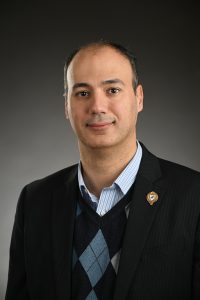This July, Fordham will welcome about 30 middle school and high school students to campus for a weeklong cybersecurity summer camp.
The camp, which will run from July 27-31, and will be geared toward students from minority communities in the Bronx, is being funded by a prestigious $100,000 grant administered by Gen Cyber, a program jointly run by the National Security Agency (NSA) and the National Science Foundation (NSF). Gen Cyber student camps are currently offered in 40 states, including four other locations in New York state.
University Professor Thaier Hayajneh, Ph.D., founding director of Fordham’s Center for Cybersecurity, said the grant is continued validation from the NSA of the University’s leadership in the field. In 2017, the NSA designated the University a National Center of Academic Excellence in Cyber Defense Education (CAE-CDE).
Fordham currently offers a master’s in cybersecurity that has more than tripled in enrollment since 2016, two computer science master’s degrees with an emphasis on cybersecurity, and a minor for undergraduates. Since 2009, Fordham has also partnered every 18 months with the FBI to organize and host the International Conference on Cyber Security (ICCS), a four-day long conference that last year drew the directors of the FBI and the NSA as well as U.S. Attorney General William Barr.
Hayajneh said the grant is part of the federal security agency’s efforts to educate the next generation of professionals in a growing and critical field.
“It’s a very important grant for the National Security Agency, because they know we have a shortage of cyber professionals. So, they start to work with middle schools and high schools to attract students from that age to go to college and pursue STEM programs with a focus on cybersecurity,” said Hayajneh.
“We need those savvy, ethical hackers and cyber analysts that can crack a code and can break a password. And of course, we’ll use their power to secure our systems, not attack or hack other systems.”
The five-day-long camp will be taught by Md Zakirul Alam Bhuiyan, Ph.D., assistant professor of computer science, as well as computer science graduate and undergraduate students. For four days, the students will be at Rose Hill. One day of classes will also be held at the Lincoln Center campus, where students will get a tour of the Center for Cybersecurity.
The camp will feature guest speakers and a capture-the-flag-style competition at the conclusion of the week. And although all of the grant-funded camps are required to focus on fundamental tenets of cybersecurity, Hayajneh said that individual camps have some leeway in how to present information. For Fordham’s first year hosting the camp, instructors will focus on smartphones. In subsequent years, the camp may focus on other aspects of cybersecurity, such as phishing or robotics.
As part of the grant, students will be given both Android and Apple phones to practice with, as well as PC software that emulates the mobile experience. In addition to reviewing different types of apps and what access they have to users’ information, instructors will review Google and Apple’s process for vetting and guaranteeing that apps are trustworthy. Students will also learn about how phones can be attacked wirelessly via Bluetooth and AirDrop, and how to defend themselves against these technologies.
“We thought that would be a good practice because everyone uses smartphones, and they’re everywhere. In many ways, we take them for granted and we don’t use the best practices when it comes to security and privacy,” he said.




